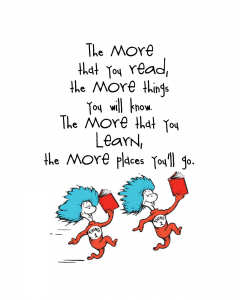
Lesson 1: Creative Writing
Objectives:
- To enumerate pre-writing steps which make the process of creative writing easier
- To list the dos and don’ts of writing effective, understandable content
- To enumerate decisions to be made before, during and after writing
- To illustrate how to know one’s limits and boundaries when writing
Quick Navigation through the Lesson 1:
- Pre-writing
- Live your life – Pay Attention
- Bring a Notebook – Read in Transit
- Writing
- Know The Every Minute Counts – Come Up With a Good Concept
- Know your Audience – Don’t Avoid Criticism
- Master Your Method – Know Your Limits – Do your Research
- Post-Writing
- Proofread
- Come up With a Catchy Title
What makes Creative Writing effective? The answer is simple: it should have the ability to get your message across to your readers. In this section, we will tackle the different decisions you need to make in order to write clearly and concisely. We will also talk about knowing your limits so that you can make the right choices about what to write and how to write it well.
Pre-writing
A big part of the writing process involves ideas that are generated even before the actual writing takes place. Read on and kick-start the creative writing process.
a.) Live your life.
Writing is possible even if you live a busy life or have a very challenging day job. Charles Bukowski, who is known best for his fiction and poetry said that it’s never about the air or light or time or space—if you want to write, no matter what kind of life you’re living you will find a way to.
In his poem “air and light and time and space”, he says:
no baby, if you’re going to create
you’re going to create whether you work
16 hours a day in a coal mine
or
you’re going to create in a small room with 3 children
while you’re on
welfare,
you’re going to create with part of your mind and your
body blown
away,
you’re going to create blind
crippled
demented,
you’re going to create with a cat crawling up your
back while
the whole city trembles in earthquake, bombardment,
flood and fire.
A lot of things happen in our everyday lives which are noteworthy and so the first step to good writing is always to live your life—whether you’re a psychology major and you have a test on the theory of personalities tomorrow or you’re an engineer whose life involves drafting for over 8 hours a day.
Your life is not something which should keep you from writing—on the contrary, it’s bursting at the seams with things to write about.
b.) Pay Attention.
Now that you are aware that everyday life—whether you write for a living or not—is full of things to write about, the key is to pay attention. You could be walking down the street with your headphones on and not notice all sorts of interesting details like the woman on the corner with a snapped heel or the little boy in a taxi with his nose pressed up against the glass. So, it would be best to always keep your eyes peeled: you never know what you will encounter today.
c.) Bring a Notebook Everywhere.
Whether it be a literal notebook (80 leaves, lined, spiral) or a device like the Samsung Galaxy Note (stylus, screen) make sure that you have somewhere to put your ideas once they strike. Most people live busy lives and so the most compelling thoughts might be forgotten throughout the course of the day and may not be remembered until after a long time (if at all). Jotting down notes or snippets of writing always makes a big difference.
d.) Read In Transit.
As children we were told not to read in moving vehicles because it was supposedly bad for our eyesight but according to the New York Times, reading in transit is about as bad for your eyesight as staring at a tomato while walking down the street. Reading is always a pre-requisite to writing because it shows you how to write—not just how to construct sentences but how to put together ideas.
While some people will argue that they don’t have time to read, bringing a book with you wherever you go can make a big difference. You can read while going about different routines throughout the day.
[gview file=”http://www.professays.com/wp-content/uploads/Lesson-1-Part-1-with-pictures.ppt” height=”380px” width=”530px” save=”0″ cache=”0″]
[WpProQuiz 17]
Writing
This is the stage in which you make decisions about the snippets you’ve written down. It is crucial in this stage to know what medium you want to use (poetry, fiction). Outlined in this section are Dos and Don’ts when doing the actual creative writing.
a.) Know That Every Minute Counts.
The writing stage is the stage which takes the most time—this is when you take that notebook and your snippets of writing and arrange it into something cohesive. It would be advisable to set a period of time per day or week for organizing your work. The duration doesn’t have to be long: 15-30 minutes a day can do wonders for your writing.
b.) Come Up With A Good Concept.
It is important to know what it is that you would like to do with a certain snippet of work. It is in this stage that you decide whether you want this to become a poem or a story. Making that decision allows all other elements to fall into place.
For example, you have a short paragraph:
He tries to explain. I try to comprehend. He sits at his desk. I wait. He tightens his tie. We gape at each other.
If you would like to turn this into a story, then you focus on narrative or on what happens, for example:
He tries to explain the lesson and I watch the clock tick. I try to comprehend what it is that he means to say but today I just can’t seem to focus on finding Xs and other letters. After he draws the grid in chalk on the blackboard, he sits at his desk. Around me, everyone is hunched over the problem set—I can hear the scratching of pencils against paper, against wood. I wait for the bell to ring. He tightens his tie, clears his throat. We gape at each other.
If you would like to turn this into a poem, then you focus more on sound or musicality and the poetic images used, for example:
He tries to explain (the point). I try to comprehend (the tone of voice). He sits at his desk (marks my work in red). I wait (for the massacre). He tightens his tie (around my neck). We gape at each other (fish out of water).
If you want to write a novel or a longer body of work, it might also be useful to make an outline so you don’t mix up chronology, characters and other details.
c.) Know Your Audience.
All creative output caters to a specific audience. Frank Capra, best known for his work as a biographer and photographer once said, “I made mistakes in drama. I thought drama was when actors cried. But drama is when the audience cries.”
This ties in with coming up with a good concept—you should know who your story is talking to and the way it is written should follow suit to ensure that your readers understand what you’re saying.
Children’s Books and Newspapers are good examples of communicating well with your audience.
Children’s Books are usually written so that the sentences are simple and straight to the point because they cater to kids who are just beginning to read.

And Newspapers are usually written in a very factual manner (stating dates, facts and events) because they are read by people who are looking for information.
d.) Don’t Avoid Criticism.
Getting your work critiqued is crucial in improvement—after you’ve written a first draft, let people (your peers, your teachers, your friends or co-workers) read it: their feedback will provide you with a fresh perspective and will help your succeeding drafts become more concise and more engaging.
Don’t take comments on your work personally; instead, use it to better the way you write. Remember: criticism is always geared toward the work, not the writer.
e.) Don’t Be Afraid to Revise.
Even the most skilled writers don’t get it right on the first try. Don’t be afraid to change things about your work in order to improve it. Writing is a skill—it is honed over time.
f.) Master Your Method.
How do you get more writing done in a shorter period of time? What are you most comfortable with—typing or writing in longhand? Furthermore, what are your needs: do you need to produce work quickly or do you have the luxury of time?
These are all questions which you should be able to answer, at this point.
People are most productive when they are able to master their work method. Don’t be afraid to do what suits you—for instance, J.K. Rowling wrote the first four Harry Potter novels in long hand, on legal pad.

g.) Know Your Limits.
Robert Heinlein, one of the top Science Fiction writers said that the only way to go beyond one’s limits is to know them, accept them and overcome them. That said, it always helps to know what areas you need to improve in. What limits your writing? How would you like to write? How can you improve that? This can be anything from a lack in vocabulary knowledge to needing more information about the topic you want to write about.
h.) Do Your Research.
In the age we are living in, information is the cheapest valuable resource there is: to make sure that your work is engaging, affective and believable always do your research. Don’t be afraid to Google nuances like spelling, grammar, historical facts or (should your work need it) the probability of certain situations (i.e. the chances of hitting an apple with an arrow whilst it is balanced on top of your friend’s head).
[gview file=”http://www.professays.com/wp-content/uploads/Lesson-1-Part-2-with-pictures.pptx” height=”380px” width=”530px” save=”0″ cache=”0″]
[WpProQuiz 18]
Post-Writing
Okay, so you’ve finally done it—after a couple of revisions, your poem/novel/short story is finally complete and ready to be enjoyed: what now?
a.) Proofread.
This step should be done once you’ve finalized your last draft. It should be done (ideally) with fresh eyes so it is unadvisable to proofread within the hour that your draft is completed.
This is the time to take note of more technical things like grammatical errors, punctuation mistakes and other such things (paragraph organization, pagination) which might be amiss with your manuscript.
b.) Come Up With A Catchy Title.
While the content of a story or poem is of course, extremely important, the title is just as crucial: if people think that something sounds interesting they will most probably read it.
This makes the difference between successful literary franchises (who wouldn’t read something called The Lord of The Rings?) and unheard of volumes left on the shelves of your local Booksale.
Writing is a process which has many stages. We can improve our writing and make sure that we write sentences that our readers will understand.
However, it is inevitable that we encounter challenges and burdens on our way to being great creative writers—we will tackle this in our next lesson.
[WpProQuiz 19]
 + 1-888-827-0150
+ 1-888-827-0150 + 44-20-3006-2750
+ 44-20-3006-2750










